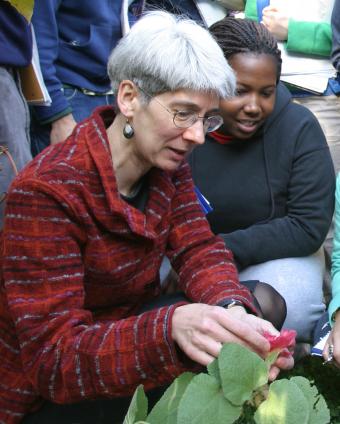The National Academy of Sciences has elected Johanna Schmitt, the Stephen T. Olney Professor of Natural History at Brown University, to become a member of the society of distinguished scholars. Election to the Academy is considered one of the highest honors that can be accorded a scientist or engineer. Schmitt, whose biological research integrates plant evolutionary ecology, physiological ecology, and ecological genomics, is the first female scientist at Brown to be elected into the Academy.
PROVIDENCE, R.I. [Brown University] — Johanna Schmitt, a Brown University evolutionary ecologist, has been elected to membership in the National Academy of Sciences (NAS), one of the highest honors that can be accorded to a scientist or engineer. Schmitt, who studies the genetic basis and evolution of plant responses to climate and other environmental cues, is one of 72 new members and 18 foreign associates elected this year in recognition of their distinguished and continuing achievements in original research.
Schmitt, the Stephen T. Olney Professor of Natural History and a professor in the Department of Ecology and Evolutionary Biology and the Center for Environmental Studies, is Brown’s first female scientist to be voted into the Academy.
“On behalf of Brown and its faculty, I extend the warmest congratulations to Annie Schmitt for this historic achievement,” said Dean of the Faculty Rajiv Vohra. “Her work – which bridges physiology, genetics and evolutionary ecology – is truly unique, extremely ambitious and worthy of national recognition.”
Schmitt, who joined the Brown faculty in 1982, studies how plants change over time in response to their environment. Schmitt and her research group use the model plant Arabidopsis thaliana — a member of the mustard family — to study how genetic variation in sensitivity to environmental cues such as day length and temperature affects reproductive success in different regions and climates. In Europe, for example, Arabidopsis can be found from Finland to Spain. How does one species thrive in so many places?
This is the question Schmitt is pursuing with an international team of experts in plant, molecular and evolutionary biology, as well as ecologists, geneticists, and computer scientists. Answers will help scientists better understand how ongoing climate change will affect crops and wild plants and point out ways to conserve species.
“I’ve had the privilege of working with so many good scientists at Brown — students, post-docs, lab managers, fellow faculty members — that I feel that this honor is shared,” Schmitt said. “I’m thrilled to join the Academy.”
Schmitt earned her Ph.D. in biology from Stanford University and conducted research at Duke University before coming to Brown. She is president of the Society for the Study of Evolution and is the past president of the American Society of Naturalists. Schmitt is a fellow of the American Association for the Advancement of Science. In 2007, she received a Humboldt Research Award.
The National Academy of Sciences is a private organization of scientists and engineers dedicated to the furtherance of science and its use for the general welfare. It was established in 1863 by a congressional act of incorporation signed by Abraham Lincoln that alls on the Academy to act as an official advisor to the federal government, upon request, in any manner of science and technology.
The NAS election was held April 29, 2008 during the 145th annual meeting of the Academy. Those elected bring the total number of active Academy members to 2,041 and foreign associates to 397.
Schmitt, the Stephen T. Olney Professor of Natural History and a professor in the Department of Ecology and Evolutionary Biology and the Center for Environmental Studies, is Brown’s first female scientist to be voted into the Academy.
“On behalf of Brown and its faculty, I extend the warmest congratulations to Annie Schmitt for this historic achievement,” said Dean of the Faculty Rajiv Vohra. “Her work – which bridges physiology, genetics and evolutionary ecology – is truly unique, extremely ambitious and worthy of national recognition.”
Schmitt, who joined the Brown faculty in 1982, studies how plants change over time in response to their environment. Schmitt and her research group use the model plant Arabidopsis thaliana — a member of the mustard family — to study how genetic variation in sensitivity to environmental cues such as day length and temperature affects reproductive success in different regions and climates. In Europe, for example, Arabidopsis can be found from Finland to Spain. How does one species thrive in so many places?
This is the question Schmitt is pursuing with an international team of experts in plant, molecular and evolutionary biology, as well as ecologists, geneticists, and computer scientists. Answers will help scientists better understand how ongoing climate change will affect crops and wild plants and point out ways to conserve species.
“I’ve had the privilege of working with so many good scientists at Brown — students, post-docs, lab managers, fellow faculty members — that I feel that this honor is shared,” Schmitt said. “I’m thrilled to join the Academy.”
Schmitt earned her Ph.D. in biology from Stanford University and conducted research at Duke University before coming to Brown. She is president of the Society for the Study of Evolution and is the past president of the American Society of Naturalists. Schmitt is a fellow of the American Association for the Advancement of Science. In 2007, she received a Humboldt Research Award.
The National Academy of Sciences is a private organization of scientists and engineers dedicated to the furtherance of science and its use for the general welfare. It was established in 1863 by a congressional act of incorporation signed by Abraham Lincoln that alls on the Academy to act as an official advisor to the federal government, upon request, in any manner of science and technology.
The NAS election was held April 29, 2008 during the 145th annual meeting of the Academy. Those elected bring the total number of active Academy members to 2,041 and foreign associates to 397.

